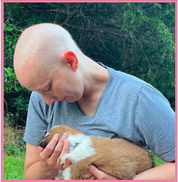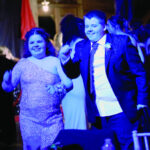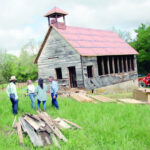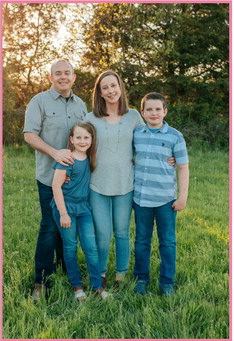
According to the American Cancer Society, when breast cancer is detected early and is in the localized stage, the 5-year relative survival rate is 99 percent. Early detection includes doing monthly breast self-exams and scheduling regular clinical breast exams and mammograms.
Vicki Forester, a 41-year-old woman from Verona, said she had been putting off getting her mammogram starting at 40.
“I noticed a sore spot on my rib by my sternum on my right side,” she said. “I thought it was probably nothing, but since I was due for a mammogram, I scheduled it.”
She went to the Breast Center of the Ozarks where they do real-time reading of the mammograms.
“I felt like I was there forever which surprised me because I didn’t think it should have taken that long,” she said. “Then they said they were going to do an ultrasound. Then the tech said, ‘I’m going to get the doctor.’
“He came in and looked at me, he had tears in his eyes and shook his head and told me, “I’m really sorry, but you have breast cancer.’” Forester said she was all alone and had driven herself, she was just kind of sitting there in shock and said the news hit her like a ton of bricks.
“A week later I went in for a biopsy,” she said. “And a week after that they said I had Invasive Ductal Carcinoma.
“I had three tumors in my left breast and was referred to a general surgeon. The sore spot on the right turned out to be nothing.”
The tumors were deep, and her breasts happened to be dense.
“I hadn’t noticed anything on the left side,” she said. “This was January 2023.
“On March first I had a double mastectomy. I had the choice for just the left breast or to do both, but I decided to do both.”
On March 21, 2023, Forester started her 20 weeks of chemotherapy.
“Now, I am on my third week of radiation,” she said. “It is every day Monday through Friday for 5 weeks.”
When she started her chemotherapy, her oncologist said she probably wouldn’t notice much for the first couple of weeks.
“But after that first treatment I was sick as a dog,” she said. “It was a Friday night. So, on Monday I got through to my doctor to get some medication for the nausea, but I was also extremely fatigued.”
Forester said her fingernails were getting damaged and her hair, eyebrows and eyelashes were falling out.
“Other than that, everything went good, and it is still going good through radiation,” she said. “My hair started to fall out in clumps, and I had these terrible bald spots, so I told my husband it was time to buzz it off.
“My sister-in-law is a cosmetologist and she got me fitted for a wig, but it was a hot summer this year and I just couldn’t do it. So I went bald and I tolerated it really well.”
Forester said her hair is growing back now in grey.
“It wasn’t grey when it fell out,” she said. “I am taking it in strides, everyone says that people pay a lot of money to get this color.
“I always had dark brown hair with a lot of natural highlights.”
Forester said she didn’t have any family history of breast cancer, although her mom Forester said she didn’t have any family history of breast cancer, although her mom who was a smoker died of lung cancer.
“My husband is a nurse practitioner, so he is very involved, and he went to town researching doctors and options,” she said. “It was a shock, but at the same time I have a peace.
“God has my life in his hands. He didn’t do this to me, but he can take it. He is in control, and he will take care of me.”
Forester was born and raised in Sikeston, south of St. Louis.
That is where I met and married my husband,” she said. “We moved here in 2011. He is from here, but his dad came to pastor at mu church and that’s how we met.”
Forester and her husband have two children a 9-year-old daughter and an 11-year-old son.
“Initially my son took it hard,” she said. “He understood quite a bit, so we have tried to be open and honest and talk through everything to keep them involved.
“We didn’t sugar coat anything, our kids are really smart.”
Forester said she children are doing great in school and as a family they try to stay active and do the same things as before.
“Our life hasn’t been to radically change,” she said. “In terms of long-term treatment, it depends on what my hormones are doing. If I am in menopause, they will give me a once per month shot. If my ovaries are still producing estrogen, they will give me meds for 5-10 years to keep me in a menopausal state.”
Forester’s cancer is estrogen receptive which means it feeds on estrogen.
“I did have immediate reconstructive surgery after the double mastectomy,” she said. “They did a direct implant. The plastic surgeon said the radiation can affect my skin so I may have to have it redone.”
Forester wants to reiterate how important self-exams are.
“Do your self breast-exams and get your breast exams done when necessary,” she said. “My doctors think the tumors had been there for one or two years. When you go in for your yearly checkups, I think you should insist on a breast exam. And if you are concerned, get a mammogram.”
Forester said another option is to get genetic testing done.





